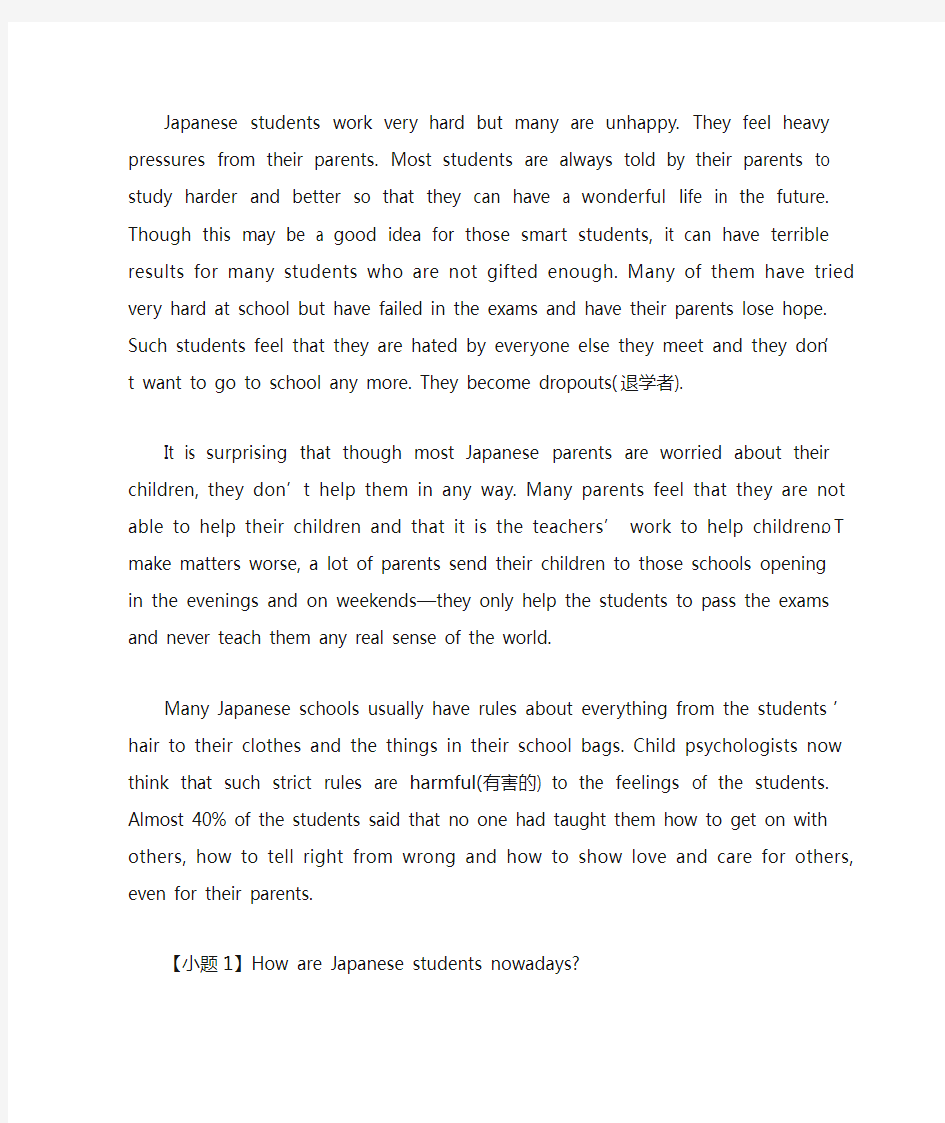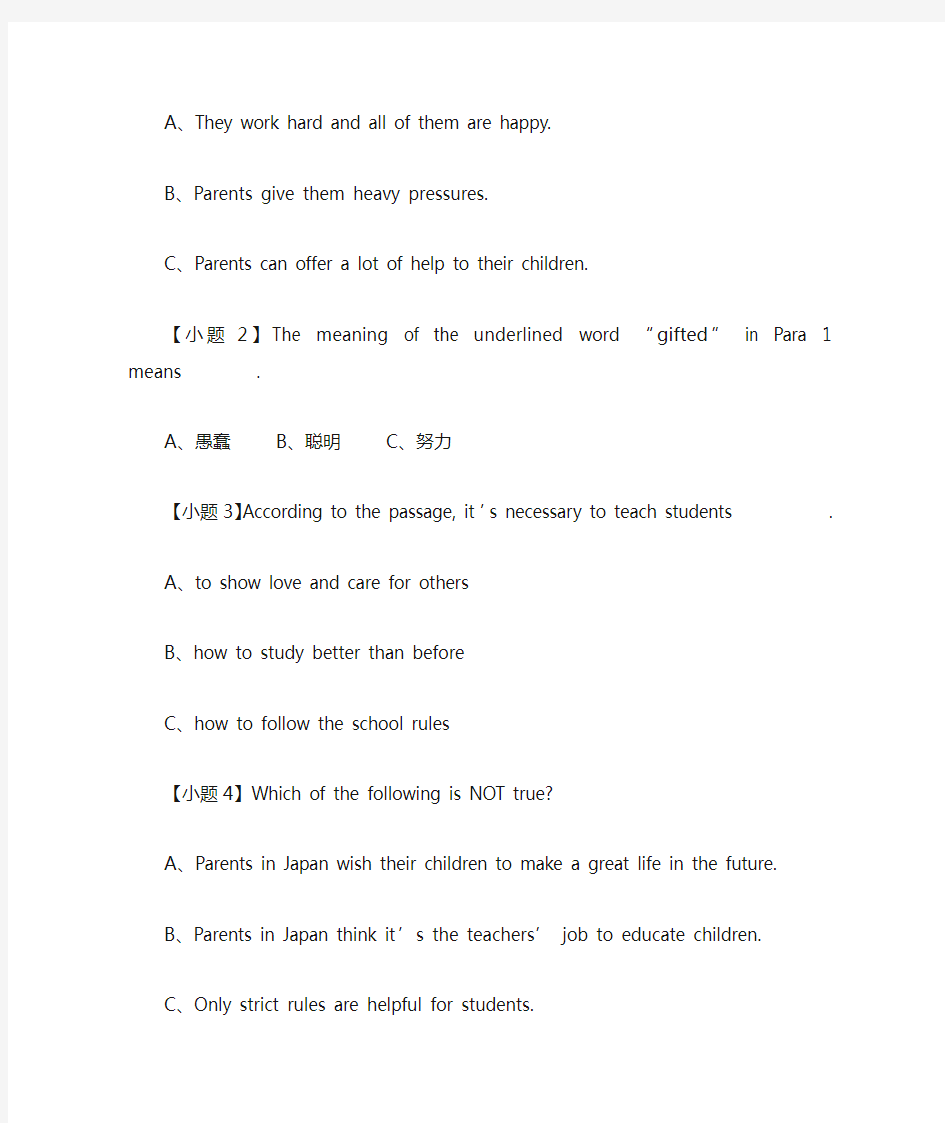Japanese students work very hard but many are unhappy


Japanese students work very hard but many are unhappy. They feel heavy pressures from their parents. Most students are always told by their parents to study harder and better so that they can have a wonderful life in the future. Though this may be a good idea for those smart students, it can have terrible results for many students who are not gifted enough. Many of them have tried very hard at school but have failed in the exams and have their parents lose hope. Such students feel that they are hated by everyone else they meet and they don’t want to go to school any more. They become dropouts(退学者).
It is surprising that though most Japanese parents are worried about their children, they don’t help them in any way. Many parents feel that they are not able to help their children and that it is the teachers’ work to help children. To make matters worse, a lot of parents send their children to those schools opening in the evenings and on weekends—they only help the students to pass the exams and never teach them any real sense of the world.
Many Japanese schools usually have rules about everything from the students’hair to their clothes and the things in their school bags. Child psychologists now think that such strict rules are harmful(有害的) to the feelings of the students. Almost 40% of the students said that no one had taught them how to get on with others, how to tell right from wrong and how to show love and care for others, even for their parents.
【小题1】How are Japanese students nowadays?
A、They work hard and all of them are happy.
B、Parents give them heavy pressures.
C、Parents can offer a lot of help to their children.
【小题2】The meaning of the underlined word “gifted”in Para 1 means .
A、愚蠢
B、聪明
C、努力
【小题3】According to the passage, it’s necessary to teach students .
A、to show love and care for others
B、how to study better than before
C、how to follow the school rules
【小题4】Which of the following is NOT true?
A、Parents in Japan wish their children to make a great life in the future.
B、Parents in Japan think it’s the teachers’job to educate children.
C、Only strict rules are helpful for students.
【小题5】In Japanese schools, .
A、most of the students become dropouts
B、teachers only teach them how to study better
C、there are rules about many things, like clothing, hairstyle and so o
解答:
【小题1】B
【小题2】B
【小题3】A
【小题4】C
【小题5】C
题目:
For more than six million American children,coming home after school means coming to an empty house.(36)___ Some may hide.But all of them have something in common.They spend
part of each day alone.They are called latchkey children.They are children who look after themselves while their parents work.(37)___
Lynette Long was once the headmaster of an elementary school.She said,"We had a school rule against wearing jewelry.A lot of kids had chains around their necks with keys attached.I was constantly telling them to put them inside shirts.There were so many keys.It never came to my mind what they meant."(38)___
She and her husband began talking to the children who had them.They learned of the impact working couples and single parents were having on their children.(39)___ One in every three latchkey children the Logs talked to reported being scared.Many had nightmares and were worried about their own safety.
The most common way latchkey children deal with their fears is by hiding.(40)___The second is TV.They'll often play it at high volume.It's hard to get statistics(情况)on latchkey children,the Longs learned.Most parents are slow to admit they leave their children alone.
A.Slowly,she learned they were house keys.
B.But they don't mind.
C.Fear is the biggest problem faced by children at home alone.
D.Some deal with the situation by watching TV.
E.Some go to their friends or their relatives.
F.And their bad condition has become a subject of concern.
G.It might be in a shower stall,under a bed or in a closet.
考点:
[科教类阅读, 逻辑推理, 任务型阅读]
分析:
本文是一篇科教类阅读.文章主要介绍了现在美国教育遇见的新情况,孩子回家以后独自一人在家,父母都上班了,这样的情况对孩子有很大的影响.
解答:
36.D推理判断题.根据第一段For more than six million American children,coming home after school means coming to an empty house.可知对于超过六百万个美国孩子,放学回家意味着来到一个空房子.由此推测,一些孩子通过看电视来解决这种情况.故选D.
37.F推理判断题.根据前两段的内容可知,文章主要介绍了美国的一种现象:孩子回家以后独自一人在家,而父母都在上班.由此推测,该处要表达的意思是:他们糟糕的状况已经成为了一个受关注的问题.故选F.
38.A细节推理题.根据前文She said,"We had a school rule against wearing jewelry.A lot of kids had chains around their necks with keys attached.I was constantly telling them to put them inside shirts.There were so many keys.It never came to my mind what they meant."可知Lynette Long先前不知道为什么会有很多孩子的脖子上挂着钥匙.后来她慢慢地知道了,他们脖子上的钥匙都是家门钥匙.故选A.
39.C细节理解题.根据后文One in every three latchkey children the Logs talked to reported being scared.可知独自待在家的孩子们会感到害怕.由此可知,此处想表达的意思是:恐惧是孩子们独自在家所面对的最大问题.故选C.
40.G细节理解题.根据前文The most common way latchkey children deal with their fears is by hiding.可知孩子处理他们的恐惧的最常见的方式是隐藏.由此可知,接下来文章将介绍这些方式.第一种隐藏的方式是:可能在淋浴间、床下或壁橱里.故选G.
